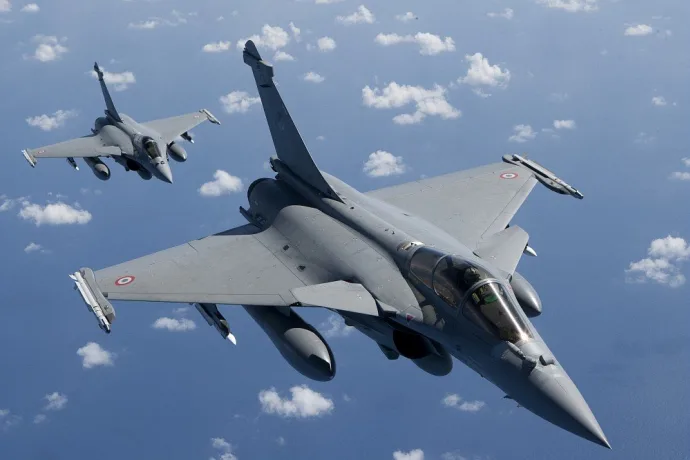France faces increasing challenges in promoting its advanced aircraft in Morocco. The Kingdom of Morocco, despite being a long-time ally of Paris, opposed the acquisition of Dassault Aviation’s Rafale fighter jets as part of its military modernization plans, according to a report in Moroccan newspaper The Parliamentarian.
failed negotiations
The paper claims that negotiations between France and Morocco over the sale of Rafale jets never materialized. Despite the cooperation of Dassault Aviation, the Directorate General of Armament (DGA) and the Elysée Palace, France was unable to persuade Rabat to sign a contract for what was considered to be French Aviation’s flagship product.
A senior French military official quoted by L’Express said of the surprising failure: “We thought we would win because it was Morocco. It was as if this country would naturally make a deal with France.” However, the result was a “disastrous failure”, mainly due to a “lack of serious involvement” on the French side.
Diversifying military alliances
Although Morocco remains a traditional partner of France, Rabat has shown a growing desire in recent years to diversify its military alliances, particularly with the United States and Israel. Despite the Rafale’s technological advantages, the deal appears to have been hampered by a lack of diplomatic and commercial flexibility and the political tensions of the past decade.
Hassan Boucantar, a prominent expert on France-Morocco relations, has commented on how aggressively other powers are courting Morocco, offering more attractive financial terms, technology transfers, and better strategic cooperation. “I underestimated how many people there would be,” he said.
Historical background of military modernization
In 2006, when Morocco decided to modernize its Mirage F1 fighter jets, it initially turned to the Elysée Palace with the intention of purchasing Rafale aircraft. However, negotiations soon descended into chaos. Dassault Aviation initially offered €2 billion for 18 Rafale planes, but the French government countered with a lower price. The offer has since been amended to include additional equipment and operational guarantees, raising the price to 2.6 billion euros, but this suggests troubling questions about the deal’s financing.
US diplomatic efforts and acquisition of the F-16
Meanwhile, the United States, backed by Lockheed Martin’s commercial influence, stepped up its diplomatic efforts. The US government has offered Morocco 24 new F-16s at a competitive price of 1.6 billion euros, much cheaper than the Rafale. Furthermore, the United States increased its political support for Morocco, particularly regarding the Sahara desert issue. In June 2007, Washington shifted from neutrality to explicitly supporting Morocco’s autonomy initiative in the disputed territory.
This diplomatic shift was followed by a $697.5 million agreement between Morocco and the Millennium Challenge Corporation, strengthening economic ties between the two countries.
By the summer of 2007, France made a last desperate attempt to salvage the deal, offering to finance the entire deal through Coface. But the decision had already been made. Morocco chose the F-16, dealing a devastating blow to France’s ambitions. Dassault and other French companies were subsequently excluded from the Marrakech Air Expo in October 2007, which represented a painful failure.
Current fleet and future plans
Since then, the Moroccan Royal Air Force (RMAF) has acquired 23 F-16C/D Block 50/52 aircraft between 2011 and 2012, but lost one during combat operations over Yemen. In early 2019, the Moroccan Royal Air Force planned to acquire additional F-16 Fighting Falcons from the United States to upgrade its existing fleet. Morocco requested 25 modern Block 72 fighter jets (F-16V) for a total cost of $3.8 billion. In response, the US State Department said it was considering approving the contract.
In August 2020, the U.S. Department of Defense awarded Lockheed Martin a contract to manufacture and supply 24 F-16 Viper multirole fighter jets to Morocco through a Foreign Military Sales Agreement.
To further strengthen its aerospace capabilities, Morocco is moving forward with plans to acquire Lockheed Martin’s fifth-generation F-35 Lighting II stealth fighter jet. The contract will include 32 stealth F-35 aircraft and has a total cost of more than $17 billion. This acquisition represents a major leap forward in the modernization of the Moroccan Air Force.
The decision to choose the US-made F-16 over the French Rafale is part of Morocco’s strategic shift towards diversifying its military alliances and strengthening its defense capabilities. The move also highlights broader geopolitical dynamics in which Morocco seeks to maintain the regional balance of power amid a growing military advance by neighboring Algeria.
As Morocco continues to strengthen its defense posture with advanced fighter jets such as the F-16 and potentially the F-35, the implications for regional security and diplomatic relations will be profound. The ongoing modernization of Morocco’s air force not only strengthens its military capabilities but also demonstrates Morocco’s determination to secure its strategic interests in the region.
Meanwhile, the Kingdom of Morocco has been provided with the entire UAE Mirage 2000 fighter jets.
The United Arab Emirates (UAE) plans to replace its fleet of Dassault Mirage 2000-9s with the delivery of 80 new Dassault Rafale F4s ordered from France last year.
If that happens, Morocco will receive 60 Mirage 2000-9s acquired in the late 1990s. Dassault Aviation recently announced that the UAE contract for 80 Rafale aircraft has come into effect. This means that you have received the down payment to make the contract valid.
The United Arab Emirates will deploy an initial 34 aircraft to support its fleet of 50 F-16s and 30 modernized Mirage F1s currently in service to counter Algeria’s vastly superior air fleet. Mirage-2000-9 will be delivered to the Moroccan Air Force.
With the arrival of 34 Emirates Mirage 2000s, Rabat now operates approximately 50 MiG-29s, 60 Su-30s, and 13 MiG-25s, and will be able to deploy the most advanced new combat aircraft in the future. It would help balance the balance of power with neighboring Algeria, which could potentially gain access. Russian fighter-bombers such as the Su-34 and Su-57 Feron stealth aircraft.


